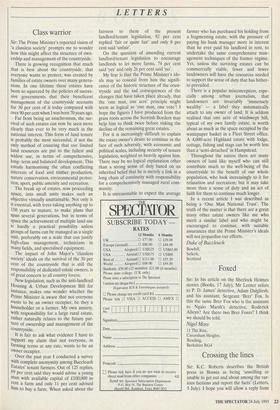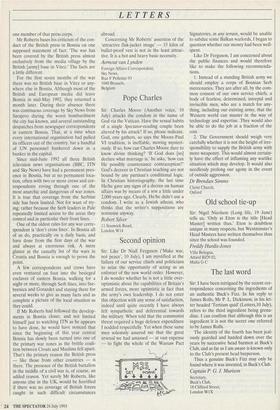Crossing the lines
Sir: K.C. Roberts describes the British press in Bosnia as being 'unwilling or unable to get out and about among the var- ious factions and report the facts' (Letters, 3 July). I hope you will allow a reply from
LETTERS
one member of that press corps.
Mr Roberts bases his criticism of the con- duct of the British press in Bosnia on one supposed statement of fact: 'The war has been covered by the British press almost exclusively from the media village by the British [army] base in Vitez.' The facts are a little different.
For the first seven months of the war there was no British base in Vitez or any- where else in Bosnia. Although most of the British and European media did leave Bosnia in mid-May 1992, they returned a month later. During their absence there was continuous coverage by Sky News from Sarajevo during the worst bombardment the city has known, and several outstanding despatches from newspaper correspondents in eastern Bosnia. That, at a time when every international organisation had pulled its officers out of the country, bar a handful of UN personnel hunkered down in a bunker in the capital.
Since mid-June 1992 all three British television news organisations (BBC, ITN and Sky News) have had a permanent pres- ence in Bosnia, but at no permanent loca- tion, often with two or more crews and cor- respondents roving through one of the most anarchic and dangerous of war zones. It is true that coverage from the Serbian side has been limited. Not for want of try- ing; rather because the Serb leaders in Pale repeatedly limited access to the areas they control and in particular their front lines.
One of the oldest rules for any war corre- spondent is 'don't cross lines'. In Bosnia all of us do, practically on a daily basis, and have done from the first days of the war and always at enormous risk. A mere glance at the casualty list of the wars in Croatia and Bosnia is enough to prove the point.
A few correspondents and crews have even ventured on foot into the besieged enclaves of eastern Bosnia, walking for a night or more, through Serb lines, into Sre- brenica and Gorazdet and staying there for several weeks to give as many facts and as complete a picture of the local situation as they could.
If Mr Roberts had followed the develop- ments in Bosnia closer, and not limited himself just to watching ITN as he appears to have done, he would have noticed that since the beginning of this year central Bosnia has slowly been turned into one of the primary war zones as the brittle coali- tion between Croats and Muslims fell apart. That's the primary reason the British press — like those from other countries — is there. The presence of the British battalion in the middle of a civil war is, of course, an added reason. Yet surely Mr Roberts, like anyone else in the UK, would be horrified if there was no coverage of British forces caught in such difficult circumstances abroad.
Concerning Mr Roberts' assertion of the `attractive flak jacket image' — 15 kilos of bullet-proof vest is not in the least attrac- tive. It is a hot and heavy basic necessity.
Aernout van Lynden
Foreign Affairs Correspondent, Sky News, Rue F Pelletier 93 1040 Brussels, Belgium



















































 Previous page
Previous page